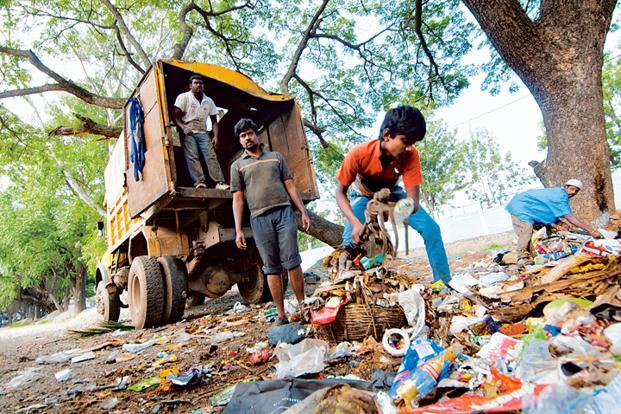While the efforts of the current government at the center who has launched a drive to clean India are laudable, a lot more needs to be done in order to achieve the goal of a clean and a better India. While many will agree that focus has to be on augmenting the facilities of drinking water and sanitation, that determine the extent of cleanliness in any society, concentrated efforts have also to be made on the solid waste management front in the major cities of India to achieve this goal of a clean and a better India. In this context, I am here presenting the introduction to my master’s thesis that was on the topic of cluster based solid waste management in the Gujarat state in India. While this constructive effort has now been since put on the backburner as no action can be seen on the ground that is still dirty, efforts should be made to revive the cluster based solid waste management systems all over the India if we want to achieve the dream of a clean India. Here is the introduction to my work way back in the year 2007.
The introduction of Municipal solid waste (management and handling) rules 2000 was a landmark event in the scenario of municipal solid waste management in India. The collection and transportation of municipal solid waste received an impetus with the introduction of these rules in the country and the situation improved a lot in this regard. But a thought has to be given to what happens to this waste after it has been collected by the municipality? In the majority of the cases, the answer is not encouraging as in the 161 municipalities of Gujarat, still this waste is being treated in a very unscientific manner and disposed off in an environmentally hazardous way.
The main reason for this is the lack of proper method for treatment and disposal of municipal solid waste. There is no technical skill or due to the lack of financial resources with the municipalities to carry out treatment and disposal of municipal solid waste generated and hence this becomes a hindrance in the effective management of municipal solid waste management in the manner that this process is not completing the loop and its incomplete without the proper methods of treatment and disposal of municipal solid waste put in place.
Gujarat state has understood this problem and has proactively undertaken an ambitious project of cluster based municipal solid waste management system for the 161 urban local bodies of the state. For this purpose the state has been divided into groups such as Kutch, North Gujarat, Central Gujarat, Saurashtra and South Gujarat. In all, 17 major cluster sites are proposed in these regions which have a waste generation capacity of 100 ton or more for being feasible for the private party to operate. For the purpose of the formation of the clusters, a comprehensive study needs to be carried out laying out the criteria for the formation of a cluster, what are the treatment and disposal methods which are suitable for the municipality of a particular size, the methods of treatment which can be adopted for a particular type of waste like vermi composting and microbial composting, the factors which determine the extent of a particular cluster and the criteria which need to be followed in the selection of a site for the development of a sanitary landfill and last but not the least the ideal specifications for a sanitary landfill. This study explores some of the issues mentioned above and tries to bring out a clear picture in this regard. Also the concept of regionalization has been studied in detail and some success stories in the form of case studies have been given which emulate this concept.
Also, a thought has to be given about the arrangements of the public private partnership which is mooted for the successful implementation of the regionalization model. This study also addresses such issues and it has given in the form of recommendations the reasons why private sector is more efficient, what are the common misconceptions and apprehensions that arise out of the entry of a private player in the area of municipal solid waste management, why should the private sector be involved in the first place in this area and in what forms the private party can participate.
For this purpose there are three options which have been worked out that are as follows:
- Hand over the functions of collection, transportation, treatment and disposal of municipal solid waste to the urban local bodies after capacity building.
- Explore the option of community participation through sakhi mandals (self-help groups).
- Form a Gujarat Asset Management Company Limited or Gujarat Solid Waste Management Agency where GUDC will act as a bundling partner for the urban local bodies.
This study is an attempt to bring about some clarity in the above mentioned issues as this area is new to the implementing agency of the project and it is hoped that it would act as a harbinger to the efforts of creating a sustainable and workable solid waste management system in the entire country which is of critical importance.
image courtesy: civildigital.com

 efficient solid waste management is key to achieving a clean India....
efficient solid waste management is key to achieving a clean India....
Leave A Comment